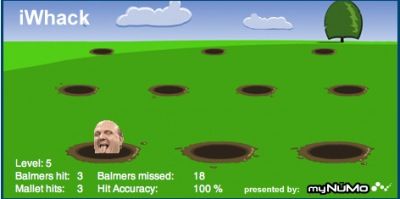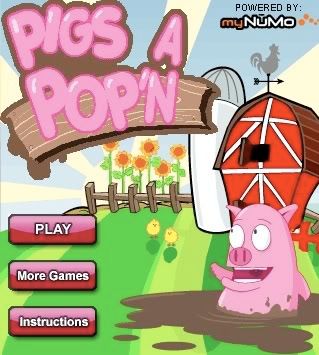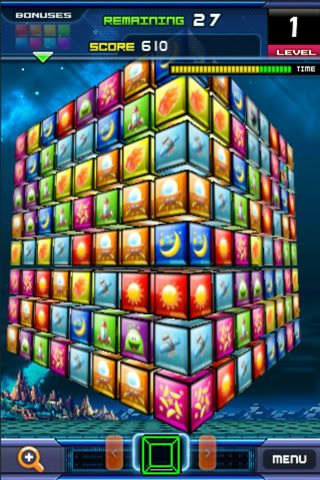I'm not going to claim that I predicted the size of the iOS market. Heck, in 2007 there were no apps or app store. At the time we had put out a popular flash game based on freeing Paris Hilton from jail and were thinking about what the next game should be when this video appeared:
YouTube: Steve Ballmer Laughs at the iPhone
So we decided that a little "Whack A Mole" game featuring him would be a fun project. We knew little about the iPhone, but we did know it was ONLY going to support web apps. Well that was the story at the time:
"Developers and users alike are going to be very surprised and pleased at how great these applications look and work on iPhone," said Steve Jobs, Apple's CEO. "Our innovative approach, using Web 2.0-based standards, lets developers create amazing new applications while keeping the iPhone secure and reliable." - Steve Jobs, June 11th, 2007
I have since come to the conclusion that this was brilliant strategy on Jobs' part, to wrest control of the phone and it's software from the carriers (anyone who developed or published games on mobile prior to 2008 can attest to this).
See: Apple's "Boca Raton" Moment - How the App Store happened
In fact, Safari was pretty good at running web apps. I would say the only real dissapointment was the lack of audio functionality. I remember Googling for every single HTML example of playing a sound effect just to see if ANYTHING worked. Nope, no sound effects.
We didn't even know the actual screen resolution of the device, so we had to work off rumors mainly. That weekend (June 30/July 1st) we managed to find people with the devices, tweeked the game and got it out:

iWhack, July 1st 2007
(Note: In Nov. of 2010 myNuMo LLC sold its game assets to PlayScreen, LLC ... where I work today).Over the next year we would build over 20 web based games, two of were among the most popular web apps according to Apple. This including everything from a bowling game to classics such as BlackJack, Keno, Darts etc... 
Pigs 'a Popin - Web Version
We had decent traffic and with $4 to $13 eCPM this looked like a good opportunity. Performance-wise Safari was superior to the J2ME handsets we had struggled with in the early 2000 decade. Then the App Store happened.Oh for a DeLorean DMC-12 and a Flux Capacitor. Here's the first lesson.1. Being FIRST matters, honest.The folks who were smart enough to get their 'classic' games out at launch succeded. Even today some of these classics are still dominated by the quite plain looking but competant apps that shipped all the way back in 2008. Yes, better versions may have shipped .. but by being first they could do the following:* Get at the top of the App Store Charts, where players find games. * Grab the best descriptive name, which made them the first app in a search for that game.If I could go back in time I would have just taken our most popular web game and made sure it was out the day the App Store opened. Amazingly, the traffic on the web-based games did not dissappear overnight. It took us a while, but we did get some great games out in the App Store (over 20), three of which were featured by Apple. We financed operations with work-for-hire projects and got to work on everything from telecom to cooking apps. That is one tough business to be in, but that broad experience was invaluable.The second lesson was this:2. It's worth giving away stuff, if it builds an audiance.The best example of this was ngmoco. ngmoco released MazeFinger as a free game in Oct. of 2008. This built an audiance for their paid titles. This in my opinion was brilliant. It created a channel for the rest of the apps. Japanese-based DeNA acquired ngmoco for $400 million USD in 2010.If I were to look back at our app-store releases prior to 2011, I would have to say that our most impressive title was Match 3D. Technologically and in terms of user interface, I am still in awe of this:
Match 3D
This was a Match-3 game in a 3D space, match-3 being a very popular puzzle type. Match 3D 'shipped' in June of 2009, got featured by Apple, and reached the top 10 of paid puzzle games. There were two different main game modes, options for timed or not timed. Bonus options ... so many ways to play this.Which leads to the third lesson:3. iOS users want Sushi knives, not Swiss Army knives. They don't want to have to select from a bunch of options to play a game. SIMPLE SELLS.You can see a great example of this in games like Tiny Wings, Temple Run and Draw Something. Draw Something is especially worth examining, as it was proceeded by several 'Pictionary-Like' games and surpassed them all. One reason? No options. In fact making the ONLY play option being a "Play With A Friend" give it a viral spread that contributed to the most rapid rise in audiance of any game in history.The most surprising thing about iOS games is just how DIFFERENT this market is from the classic video game and computer game industry I had worked in for three decades. There's a certian iPhone-ness about the best titles. It's more than just one art style or user interface approach. Hard to describe, but I know it when I see it.Can be anything from the one-button visual ellegance of Tiny Wings, to the great interfaces of Paper Toss, Temple Run and yes ... Angry Birds.So, did we apply this knowledge? Well yes, in early 2011 we shipped Bocce-Ball and it became the best selling Bocce game in the App Store. Hit #1 in all apps in Italy, #6 in the USA. We also have a very popular Poker game and puzzle title (Crickler Daily Word Puzzle). The lesson there? Number four. 4. As a wise man once said "The Interface Is The Game." More so on iOS than any other platform.Who can forget how many early iOS games used tilt as the main UI. Now if it appears, as it does in Temple Run, it's an adjunct to the main interface (swipes in that game). The success we had with Bocce was based, once again ... my opinion, on extending the cool interfaces we saw in Paper Toss, Fruit Ninja and other games.This can also work against you, I'm still not in love with any of the first person shooters on iOS ... but then again, I prefer the computer to the console with these games as well.But what's the biggest lesson after five years? Chew on this:For the entire life of the NES there were only 785 Carts in TOTAL shipped for the USA and Europe. As of Feb. 2012 there are 725,700 Apps on the iOS App Store. This is a hyper-competitve market. So the final lesson?5. Marketing Matters and Marketing begins with design. Once again, Draw Something comes to mind ... with the decision to limit play to just social play. But there's also the awesome video trailers created for games like "Tiny Wings" and yes ... Angry Birds. And there's the relentless marketing efforts behind many of the top grind games, the hard hard work to come up with a great unified message and taking that message to the channels that work. The absolute necessity of listening to your players and making the changes you need to make.It's even about design decisions ... even the basic decision of what to build. There's a great resource in just looking and playing the apps that work. I look at the charts every day. I try as best as I can to listen to the discussions in the game groups too.Every week there's a title that surpries me. This is a constantly evolving marketplace.Finally:6. These are the good old days.There's never been a lower friction, lower barrier to entry market in the history of video games. Anyone can (and sometimes does) come up with the next Angry Birds (yeah, we've got one in the works ... I do believe that). The odds? No worse than writing the next great novel, the next popular song or the next Oscar winning movie. What a difference between the classic video game market. Just imagine the expense of trying to put out a Nintendo cart as an independent. And it wasn't much better in the mobile game industry prior to 2008 (well, unless you were in Japan coding for DoCoMo).These are great times with great opportunities. Go for it. 



